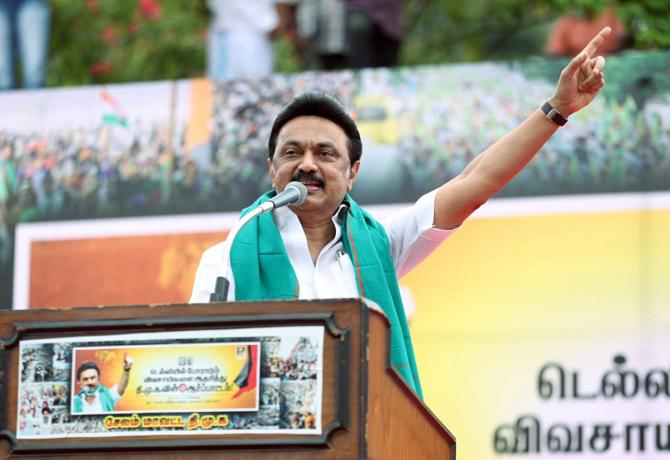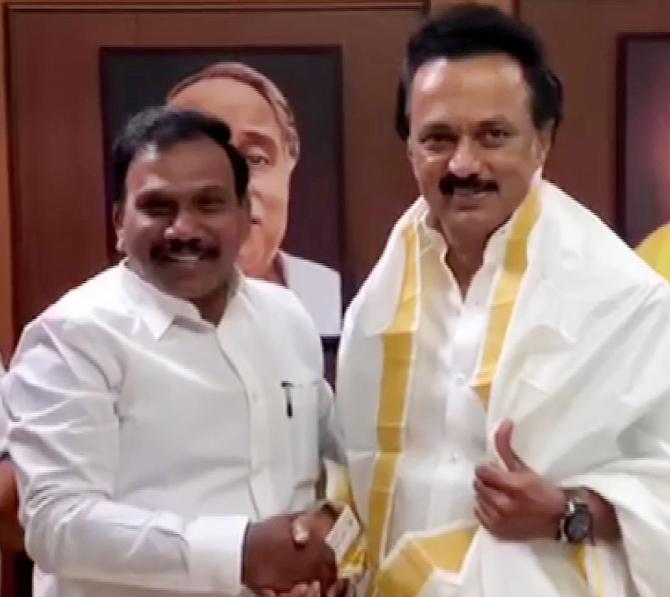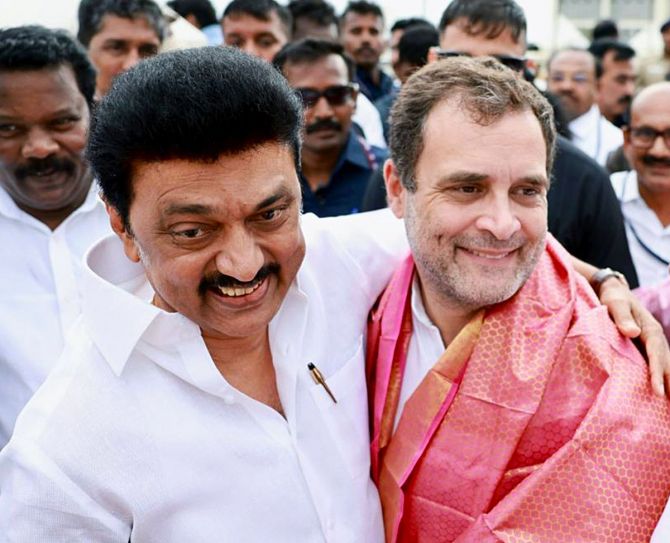Party insiders concede statements of the Raja kind have the potential to hurt the DMK's electoral chances in closely-fought seats in 2024, observes N Sathiya Moorthy.

If someone thought that by triggering avoidable controversies centered on religious issues they could divert public attention from real-life issues like the recent steep hike in property tax and power tariffs in DMK-ruled Tamil Nadu, they may be mistaken.
While the religion-centric controversies are passe, monthly power tariff hikes and half-yearly property tax hikes, going up to 50 percent in some cases, will pinch the voter's pocket every month without fail, thus making up for the loss of social media attention between now and the Lok Sabha polls in the summer of 2024.
Among the issues in social media discourse is one involving former telecom minister A Raja, a DMK deputy general secretary and the Lok Sabha MP from the Nilgiris constituency.
As has become his wont, Raja, whose name became nationally known after facilitating 10-paise mobile calls in his time as minister, and the notorious 2-G scam, derived from then CAG Vinod Rai's 'notional income' theory, has targeted Hinduism and what the likes of him dub as Brahminical Manu Smriti, one more time.
Addressing a rally of the DMK's ideological parent Dravida Kazhagam recently, Raja was harsh on Manu Smriti and said according to the book that codified the ancient Hindu way of life, so to say, that all non-Brahmins were Shudras. Or, words and sentences to that effect.
The pro-Hindutva social media was quick to challenge him both on form and content. The latter had been their weak spot in many cases.
As they pointed out, and rightly so, the Manu Smriti did not say every non-Brahmin was a Shudra.
Instead, it graded communities according to traditional trade practices -- namely, Brahmins (religious matters), Kshatriyas (ruling class), Vaishyas (traders) and Shudras (farmers).
Yes, as Raja pointed out, there were the 'panchamars', now known as Dalits, who still remain untouchables. But in no place has the Vedic era book said that all non-Brahmins were Shudras or all Shudras were untouchables.
As some of these social media activists have taken the argument forward, ironically it is in contemporary 'Dravidian' Tamil Nadu that untouchability is being practiced even more -- and Brahmins are not the perpetrators.
They cite the more recent incident in a village in the southern district of Tenkasi, where the civil-and-police authorities together sealed a local shop and arrested its owner for refusing to sell sweetmeats to local Dalit children, following the decision of the khap panchayat of the intermediary community to which he belonged.
The police has since barred other accused in a related case from the village under relevant laws aimed at protecting the nation's scheduled caste-scheduled tribe communities.

By extending the argument, some of these Hindutva portals have asked Chief Minister Stalin for his opinion/decision on Raja's averments, given the fact that his wife Durga Stalin and other members of his family were known to be worshipping at various temples across the state and elsewhere in the country, including Tirupati and Kasi.
This, they add, may also offset the marginal gains in anti-DMK perceptions that the good work of HR&CE Minister P K Sekarbabu has achieved since the party returned to power in May 2021.
Of course, there is consternation, as much in the party as from its adversaries, that Sekarbabu has since given up on his initial drive to retake thousands of acres of temple lands in the possession of usurpers and long-term tenants, who were neither paying the market rent nor any rent at all. Questions are already being raised on this score.
Party insiders concede statements of the Raja kind, which are also mouthed by the DMK's Dharmapuri MP Dr Senthilkumar and alliance VCK leader Thol Thirumavalavan, MP, have the potential to hurt the combine's electoral chances in closely-fought seats in 2024.
They have no hesitation conceding that many of the poll battles that year would be closely fought, unlike in 2019 (Lok Sabha election) and 2021 (state assembly election).

As coincidence would have it, another religion-centric controversy came up after the Tamil Nadu Waqf Board, in legal control of institutionalised Islamic properties under the law, has claimed ownership of all properties in seven villages of south-central Tiruchi district.
'This is Waqf property which was encroached on to some extent. To stop the encroachment, the board passed an official resolution and communicated it to all sub-registrar's offices in control of all forms of land alienation,' Tamil Nadu Waqf Board Chairman Abdul Rahman has been quoted as saying.
Rahman has also cited the existence of official archival material to this end.
However, agitated villagers, who are as much attached to their holdings as anyone else across the country, have contested the Waqf Board's claims.
They have shown to whoever is willing to see and hear them, parent documents of properties in their possession -- and/ or in their names or those of their ancestors, near and distant.
It is not unlikely that the Waqf Board's claims are based on some documents.
Some even suggest that like the erstwhile kings who had bestowed lands and villages to particular communities, particularly the priestly Brahminical class, someone in the line of the erstwhile Arcot nawabs might have likewise given away land to the Muslim community for the regular maintenance of local mosques and madrasas.
It is thus that the entire Thiruchendurai village, measuring close to 390 acres, in Tiruchi district, has been mentioned as 'whole inam village', with relevant gazette notification numbers in the 245-page Waqf Board circular to the sub-registrars, sent out in August this year.
However, board authorities point out that in some cases, they do not have the survey numbers, etc, but only the extent of land and the name of the village(s), but in most cases they have all the relevant details annexed to their announcement/claims.
According to them, however, they were only trying to identify and locate waqf properties that had either been encroached upon or alienated one way or the other, only to avoid further misuse.
Those now possessing the properties could continue to enjoy them, it is said.
Indications however are that prospective buyer of these properties, from the present owners/occupants, would be wary of getting caught in avoidable legal hassles.
Those of the latter who have been counting on the proceeds from the sale of the property to meet some family exigencies are not being put to hardship, for no fault of theirs.
Maybe, the timing of the 'Raja row' just helped to take away some of the political tinge attaching to what is likely to emerge as a huge land dispute covering almost every part of the state.
Truth be told, it is not a political dispute, but a legal issue, if it came to that, based on documentation and relevant laws, as existed in the past and at present.
Yet, given the Hindutva brigade's tendency and tenacity to make a religious controversy of what essentially may be a property dispute, however, complicated and widespread it be, the ruling party especially may not have heard the last word, especially ahead of the Lok Sabha polls.
Then, there is a third issue, where neither the DMK, nor the state government is involved, but still has an element of politics to it -- yet, there is an element of religious identification to it.
A division bench headed by Justice G R Swaminathan at the Madurai bench of the Madras high court recently sentenced self-styled whistle-blower and YouTuber 'Savukku' Shankar to six months in prison for contempt of court.
The cases related to a host of posts and interviews of Shankar, a former state government employee under suspension for being an eavesdropper/whistle-blower when in service in 2008 or thereabouts, which the court found to be denigrating the judiciary.
There is still a pending original case that Justice Swaminathan initiated suo motu, again, for Shankar casting aspersions on his personal integrity for granting bail to a Hindutva blogger, Maridhas. That case is yet to be taken up.
If Shankar, who challenged the bench and the judiciary, inside the court and outside, to argue that he could prove his charge, given an opportunity, his supporters seem to claim that he was not given that opportunity.
It remains to be seen if Shankar, who argued the case in person before the Madurai bench, would go on in appeal.

At the practical-level for the DMK, periodic ideology-driven diatribes likes those of Raja especially have the problem of diverting public attention from popular schemes like the 'free breakfast scheme for school children', a pet project of CM Stalin. The Raja-created controversy took the focus away from the scheme, without actually diverting public attention from property tax and power tariff hikes.
In between, there are issues like another party general secretary Subbulakshmi Jagadeesan (75) announcing her quitting all DMK posts, including primary membership -- and also her retirement from active politics, weeks after she had put sent in her papers to the party boss.
A status quoist who does not want to upset the apple cart much as he desires to inject fresh blood at all levels, Stalin is equally keen on not dissuading those who want to quit from the top echelons.
A minister under chief ministers MGR and M Karunanidhi, the latter in the late eighties, after she crossed over to the DMK, and also a minister of state at the Centre for a term, Subbulakshmi was slated for a cabinet berth last year. But she lost her native Modakurichchi seat to a BJP greenhorn in C Saraswathi.
What more, she is remembered more for her share of LTTE-linked controversies during the Karunanidhi regime, in the long run-up to the Rajiv Gandhi assassination, and the DMK's total rout in elections 1991.
It is a patch of history that the party leadership would like to leave far behind -- just as it would not want to be embarrassed by the Raja-like statements that are not only out of turn, but also out of context and immediate socio-political and electoral circumstances!
N Sathiya Moorthy, veteran journalist and author, is a Chennai-based policy analyst and commentator.
Feature Presentation: Rajesh Alva/Rediff.com










